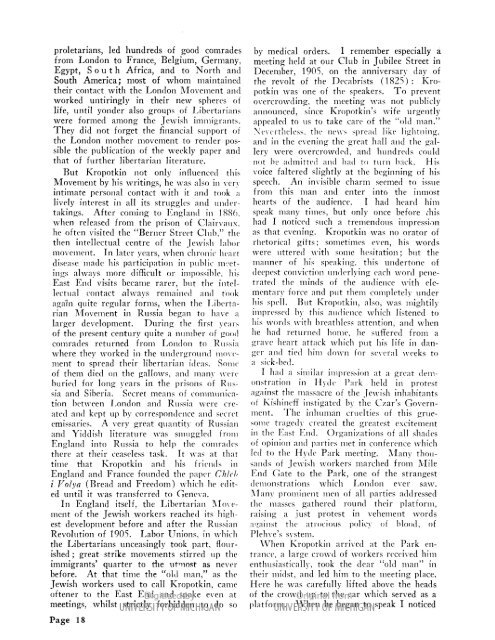Centennial Expressions on Peter Kropotkin 1842-1942.
Centennial Expressions on Peter Kropotkin 1842-1942.
Centennial Expressions on Peter Kropotkin 1842-1942.
You also want an ePaper? Increase the reach of your titles
YUMPU automatically turns print PDFs into web optimized ePapers that Google loves.
proletarians, led hundreds of good comrades<br />
from L<strong>on</strong>d<strong>on</strong> to France, Belgium, Germany,<br />
Egypt, S ou th Africa, and to North and<br />
South America; most of whom maintained<br />
their c<strong>on</strong>tact with the L<strong>on</strong>d<strong>on</strong> Movement and<br />
worked untiringly in their new spheres of<br />
life, until y<strong>on</strong>der also groups of Libertarians<br />
were formed am<strong>on</strong>g the Jewish immigrants.<br />
They did not forget the financial support of<br />
the L<strong>on</strong>d<strong>on</strong> mother movement to render possible the publicati<strong>on</strong> of the weekly paper and<br />
that of further libertarian literature.<br />
But <strong>Kropotkin</strong> not <strong>on</strong>ly influenced this<br />
Movement by his writings, he was also in verxy<br />
intimate pers<strong>on</strong>al c<strong>on</strong>tact with it and took a1<br />
lively interest in all its struggles and undertakings. After coming to England inl 1886,<br />
when released from the pris<strong>on</strong> of Clairvaux.<br />
he often visited the "Berner Street Club," the<br />
then intellectual centre of the Jewish lahor<br />
movement. In later years, when chr<strong>on</strong>ic heart<br />
disease made his participati<strong>on</strong> in public m:'etings always more difficult or impossible, his<br />
East End visits became rarer, but the intellectual c<strong>on</strong>tact always remained an(d t]ook<br />
again quite regular forms, when thie ibertarian -Movement in Russia began to have a<br />
larger development. During the first years<br />
of the present century quite a nnluber of good<br />
comrades returned from L<strong>on</strong>d<strong>on</strong> to Russia<br />
where they worked in the underground iovcement to spread their libertarian ideas. S<strong>on</strong>nc<br />
of them died <strong>on</strong> the gallows, an(d many were<br />
buried for l<strong>on</strong>g years in the pris<strong>on</strong>s of R ussia and Siberia. Secret means of communicati<strong>on</strong> between L<strong>on</strong>d<strong>on</strong> and Russia were created and kept up by corresp<strong>on</strong>dence and secret<br />
emissaries. A very great quantity of Russian<br />
and Yiddish literature was smulggled fromi<br />
England into Russia to help the comrades<br />
there at their ceaseless task. It was at that<br />
time that <strong>Kropotkin</strong> and his friends in<br />
England and France founded the paper Chleb<br />
i Volya (Bread and Freedom) which he edited until it was transferred to Geneva.<br />
In England itself, the Libertarian Movement of the Jewish workers reached its highest development before and after the Russian<br />
Revoluti<strong>on</strong> of 1905. Labor Uni<strong>on</strong>s, in which<br />
the Libertarians unceasingly took part, flourished; great strike movements stirred up the<br />
immigrants' quarter to the utmost as never<br />
before. At that time the "old man," as the<br />
Jewish workers used to call <strong>Kropotkin</strong>, came<br />
oftener to the East End and spoke even at<br />
meetings, whilst strictly forbidden to do so<br />
Page 18<br />
by medical orders. I remember especially a<br />
meeting held at our Club in Jubilee Street in<br />
December, 1905, <strong>on</strong> the anniversary day of<br />
the revolt of the I)ecabrists (1825): I<strong>Kropotkin</strong> was <strong>on</strong>e of the speakers. To prevent<br />
overcrowding, the meeting was not publicly<br />
announced, since <strong>Kropotkin</strong>'s wife urgently<br />
appealed to uts to take care of the "old man."<br />
Nevcrtlheless, the news spread like li ghtiing,<br />
and in the evening the great hall and the gallery were overcrowded, and ho undreds cotuld<br />
not be a~lmitted and hIiad to tutrn back. His<br />
voice faltered slightly at the beginning of his<br />
speech. An invisible charm seemed to issue<br />
from this man and enter into the inmost<br />
hearts of the audience. I had heard him<br />
speak many timhes, but <strong>on</strong>ly <strong>on</strong>ce before this<br />
had I noticed such a trenmendouis impressi<strong>on</strong><br />
as that evening. <strong>Kropotkin</strong> was no orator of<br />
rhetorical gifts; sometimes even, his words<br />
were uttered with some hesitati<strong>on</strong>; but the<br />
manner of his speaking, this undert<strong>on</strong>e of<br />
deepest c<strong>on</strong>victi<strong>on</strong> nlderlying each word penetrated the minds of the audience with elementary force and put them completely under<br />
his spell. 3Butt <strong>Kropotkin</strong>, also, was llightily<br />
imnpressed by this audience which listened to<br />
hlls wor(ds with breathless attenti<strong>on</strong>, and when<br />
lie had returned home, he suffered from a<br />
grave heart attack which putt his life in danger and tied himn down for several weeks to














![The Philosophy of Progress [pdf]](https://img.yumpu.com/14077359/1/190x245/the-philosophy-of-progress-pdf.jpg?quality=85)

